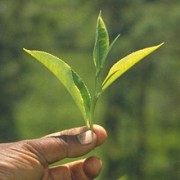|
 Recent research has explored the potential health attributes of tea {Camellia Sinensis) through studies in humans and animal models, and through in vitro laboratory research. The research suggests that tea and tea flavonoids may play important roles in various areas of health and may operate through a number of different mechanisms still being explored. Recent findings include: Recent research has explored the potential health attributes of tea {Camellia Sinensis) through studies in humans and animal models, and through in vitro laboratory research. The research suggests that tea and tea flavonoids may play important roles in various areas of health and may operate through a number of different mechanisms still being explored. Recent findings include:
•The antioxidant properties of tea flavonoids may play a role in reducing the risk of cardiovascular disease by decreasing lipid oxidation[1], reducing the instances of heart attacks and stroke[2,3], and may beneficially impact blood vessel function, an important indicator of cardiovascular health.
•Tea flavonoids may lower the risk of certain cancers by inhibiting the oxidative changes in DNA from free radicals and some carcinogens[1]. Tea may also promote programmed cell death, or apoptosis[4], and inhibit the rate of cell division, thereby decreasing the growth of abnormal cells[1].
•Tea-drinking has been associated with oral health[5] and bone health[6].
•Compounds in tea other than flavonoids have been shown to support the human immune system[7].
References:
[1] Weisburger JH. Tea and health: the underlying mechanisms. Proc Soc Exp Biol Med 1999;220:271-5.
[2] Hertog MGL, Feskens EJM, Hollman PCH, et al. Dietary antioxidant flavonoids and risk of coronary disease: the Zutphen Elderly Study. Lancet 1993;342:1007-11.
[3] Keli SO, Hertog MGL, Feskens EJM, Kromhout D. Dietary flavonoids, antioxidant vitamins, and incidence of stroke. Arch Intern Med 1996;156:637-42.
[4] Isemura M, Saeki K, Kimura T, Hayakawa S, Minami T, Sazuka M. Tea catechins and related polyphenols as anti-cancer agents. Biofactors. 2000;13(1-4):81-5.
[5] Sarkar, S., Sett, P., Chowdhury, T., and Ganguly, D.K. Effect of black tea on teeth. J Indian Soc Pedod Prev Dent 2000;18:139-140.
[6] Hegarty VM, May HM, Khaw K-T. Tea drinking and bone mineral density in older women. Am J Clin Nutr 2000;71:1003-7.
[7] Kamath AB, Wang L, Das H, Li L, Reinhold VN, Bukowski JF. Antigens in tea-beverage prime human Vgamma 2Vdelta 2 T cells in vitro and in vivo for memory and nonmemory antibacterial cytokine responses. Proc Natl Acad Sci USA 2003 May 13;100(10):6009-14.
NOTE: As the title of this page indicates, these are the "purported" health benefits of tea. QED provides the above solely as information, NOT as medical advice. As with anything you consume for health or medical reasons, first seek advice from a health care professional before use.
|